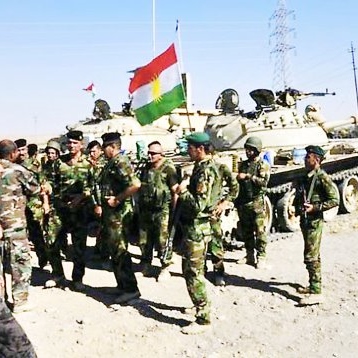
World

The gamble that was destined to fail…
PAULA SLIER
An ethnic minority in the Middle East, the Kurds inhabit an area spanning adjacent parts of south-eastern Turkey, north-western Iran, northern Iraq and northern Syria. Many of them would like to secede from the countries they currently inhabit and form an independent state of their own.
The war in Syria and the fight against Islamic State (ISIS) provided the perfect fodder. Western allies gave the Peshmerga (the Iraqi Kurdish military force) weapons, training and air support in a partnership that benefited both sides.
The West did not need to send in ground troops, as the Peshmerga fought on its behalf and, in turn, captured lands that ISIS had previously taken from the Iraqi army with the intention of holding onto them in a future independent Kurdish state.
The first step in this direction came this time last month when Iraqi Kurds held a referendum in which – it came as no surprise – 93 per cent voted to secede from Baghdad. But the Iraqi government was having none of it and sent its army to retake Kurdish advances that included the Kirkuk oilfield where up to one million barrels of oil is pumped each day, almost half of all Iraqi oil exports.
If current estimates are anything to go by, this latest turn of events has set Kurdish dreams for statehood back by at least a generation.
When the fighting with ISIS was at its worst, I spent a few days embedded with the Peshmerga in northern Iraq. We drove through no-man’s land, me sitting in the passenger seat with a Kalashnikov resting against my legs. Every time the car lurched, my heart went with it.
We passed through villages, that although recently liberated by the Peshmerga, had been booby-trapped with IEDs by ISIS fighters on their retreat, so as to discourage residents from returning. The countryside was dotted with refugee camps where these people, many of them shell-shocked, had found temporary shelter.
Here, too, it was dangerous to venture, as one never knew whether a camouflaged ISIS supporter might suddenly pounce and kidnap a Western journalist.
A Peshmerga commander welcomed us to his hideout. We sat on the sand drinking sweet mint tea in tiny glasses balanced on broken saucers. The commander apologised that he couldn’t be more hospitable as, “I didn’t have time to prepare for your arrival”, he chuckled.
I slept outside, sheltered by sandbags through which, aided by binoculars, I could see the black ISIS flags waving ominously above nearby rooftops. The fighters were about a kilometre away and at night, the bombing rounds from Western planes were “like music to our ears”, the commander said.
“We appreciate the secret training we’ve received from the Israelis,” he confessed. An open secret, over the years Israeli soldiers have trained Peshmerga fighters and the Mossad has helped arm them.
Jews and Kurds share a long and friendly history and a study conducted a few years ago at the Hebrew University, found that the Kurds could be the people closest to Jews from a genetic point of view.
According to tradition, the first Jews in Kurdish-populated northern Iraq, were among the last tribes of Israel, taken from their land in the eighth century BC. They were treated so well that many chose never to leave.
Fast forward to 1948 with the establishment of Israel and they departed en masse. Decades on and some Kurdish leaders are still bemoaning this exodus.
After the Six Day-War of 1967 when remaining Iraqi Jews were desperate to flee, the Kurds helped some 1 000 of them to escape, overland to Iran, and then by plane to Israel.
Since the 1960s, Israel has maintained discreet military, intelligence and business ties with the Kurds. Israel has been the only major power to endorse their statehood and Israeli Prime Minister Benjamin Netanyahu lobbied world powers to support their referendum last month.
But they’re up against some stiff opposition. Iraq wants to keep her country intact and so is against any kind of Kurdish secession. Iran and Turkey fear it will escalate separatist ambitions among their Kurdish minorities, and the United Nations Security Council worries a Kurdish breakaway could disrupt military efforts to defeat ISIS.
By comparison, an independent and friendly Kurdistan in the heart of the Middle East, would be a godsend for Jerusalem. Both Kurds and Israelis are minorities in an inhospitable region and in need of friends and international allies.
Moreover, an independent Kurdistan could serve as a base for Israeli operations against Iran – something Tehran is all too aware of. Iranian-backed militias have been helping the Iraqi army in her recent battles against the Kurds.
But perhaps the most convincing reason as to why Israel should support the Kurds in their push for statehood, is the moral and emotional one. “Our two nations have fought against all odds and live in a neighbourhood where those surrounding us want to destroy us,” a Kurdish Israeli tells me.
Today some 200 000 Kurdish Jews live in Israel and many are vocal supporters of the Kurdish push for independence. Israeli flags can often be seen at Kurdish rallies, although the official Kurdish leadership traditionally shies away from publicly engaging with Israel, so as not to antagonise the Arab world.
Now, after they’ve been forced to retreat in the face of the Iraqi army, they might be questioning the gamble they took – putting their lives on the line for a dream that hasn’t materialised. For Israelis, though, there was never a question – they had nothing to lose by supporting their Kurdish brothers.
Paula Slier is the Middle East Bureau Chief of RT, the founder and CEO of NewshoundMedia and the inaugural winner of the Europcar Woman in Leadership Award of the South African Absa Jewish Achievers.




